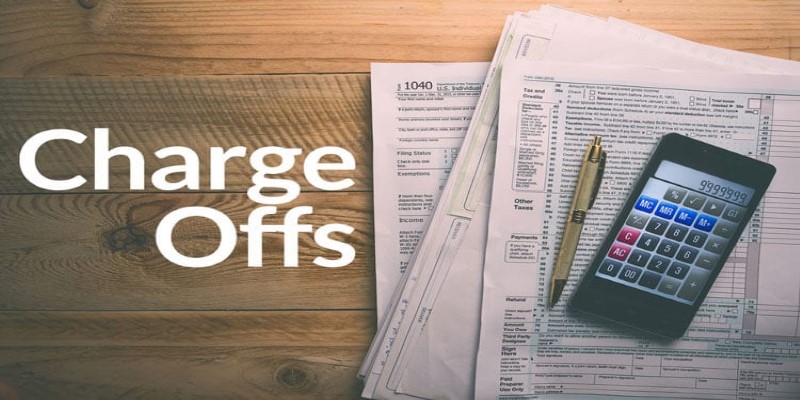Advertisement
Maybe you have heard of the word "charge-off" or been told you had done one. It sounds worse than it really is, but it is something you need to understand. A charge-off simply occurs when a lender or credit card issuer declares that a debt is too unlikely to be paid for them to continue carrying as an active record. This, however, does not mean that the debt is forgiven because it is "charged off." The implications of charge-off can be long-term, especially regarding your credit report and your future.

Understanding what a charge-off is, how it affects your credit, and what you can do about it will be a critical step forward. In this article, we shall break down what a charge-off is, why it happens, and what can be done about it.
At its core, a charge-off is basically a decision by the creditors that a debt will probably never be paid. This usually arises when several months of payments are missed, often after 180 days or more have been missed. When a charge-off occurs, the lender or creditor then writes the debt off as a loss in their books.
But don't be fooled. A charge-off does not discharge the obligation of the debtor to pay. The debt remains open and may be collected either directly from the debtor or sold to a third-party collector. Indeed, the charge-off will continue to appear on the borrower's credit report for as long as seven years from the date of the charge-off, even if the account is eventually paid off.
Charge-offs are usually for credit cards, personal loans, car loans, and all other unsecured debt. The lender will mark your account as "charged off" on your credit report, which lets everyone who checks your credit know you failed to pay. That can have very serious effects on your credit score.

This also lowers your credit score and is one of the severe effects of charge-offs. It's a significant derogatory mark on your credit report, and your score will be reduced to a considerably lower value. Nonetheless, the damage is dependent on your credit score at that time, and even persons with high scores will experience a drastic drop in their scores.
For example, if you had a credit score of 750 before a charge-off, the account would drop by 100 points or more after being marked as charged off. If your credit score was already low, in the range of 600, the drop would also be significant but probably not as severe.
The key thing to remember is that a charge-off is a signal to potential lenders that you've failed to meet your obligations, so you are a higher-risk borrower. This can affect the ability to get approved for new credit, whether it's a mortgage, a car loan, or even a new credit card. It can also result in higher interest rates if you are approved, as lenders will factor in your charge-off when determining your creditworthiness.

If a charge-off appears on your credit report, its not the end of the road. While its certainly a significant setback, there are a few options you can explore to minimize its impact. The first step is understanding how you got to this point in the first place so you can avoid similar mistakes in the future.
One option is to reach out to the creditor and try to negotiate a settlement. In some cases, creditors may be willing to accept a lump-sum payment that is less than the full amount owed. If they agree to this, you may be able to have the charge-off removed from your credit report. Keep in mind, however, that this is not guaranteed, and it may take some negotiation and persistence on your part.
Another option is to work with a credit counselor or financial advisor. They can help you develop a plan to pay off your debt and repair your credit over time. This might involve setting up a repayment plan with the creditor or working through a debt management program.
Even if youre unable to have the charge-off removed, paying off the debt or settling it will stop the collection efforts and reduce the negative impact on your credit score over time. Once the debt is resolved, the creditor will update your credit report to show that the account is either "paid" or "settled," which is better than having an outstanding charge-off.
Preventing charge-offs requires proactive management of your finances. The best way to avoid charge-offs in the future is by staying on top of your bills and paying them on time. Setting up automatic payments or reminders can help ensure you dont miss due dates, and it can help keep your credit score in good standing.
If youre struggling to make ends meet, its important to reach out to creditors before the situation escalates. Many creditors offer hardship programs for individuals who are experiencing financial difficulty. These programs may allow you to lower your monthly payment or temporarily suspend payments without facing a charge-off.
Additionally, focusing on building an emergency savings fund can help you avoid falling behind on bills when unexpected expenses arise. Having a financial cushion to fall back on can prevent late payments and reduce the risk of charge-offs in the future.
A charge-off is not the end of the world, but it can have serious consequences on your credit and overall financial health. The important thing to remember is that its not a permanent mark on your financial record, and there are steps you can take to recover from it. By negotiating with creditors, paying off debts, and taking steps to manage your finances more effectively, you can minimize the long-term impact of a charge-off.
Advertisement

By Elena Davis/Jan 02, 2025

By Martina Wlison/Oct 18, 2024

By Sid Leonard/Oct 05, 2024

By Maurice Oliver/Dec 26, 2024

By Aldrich Acheson/Oct 31, 2024

By Kristina Cappetta/Dec 26, 2024

By Madison Evans/Oct 18, 2024

By Aldrich Acheson/Oct 29, 2024

By Mason Garvey/Jan 01, 2025

By Christin Shatzman/Oct 10, 2024

By Christin Shatzman/Jan 01, 2025

By Christin Shatzman/Oct 14, 2024